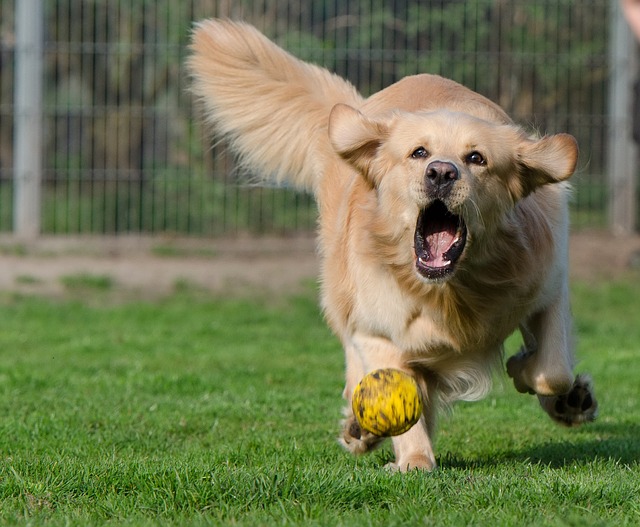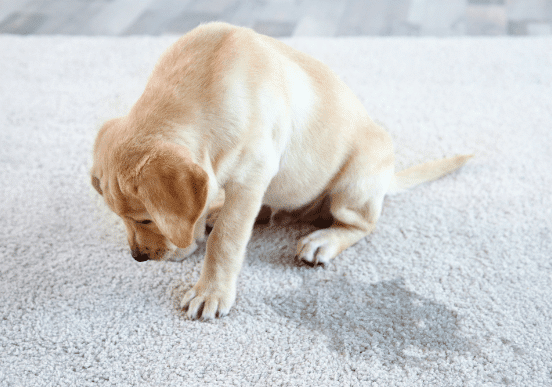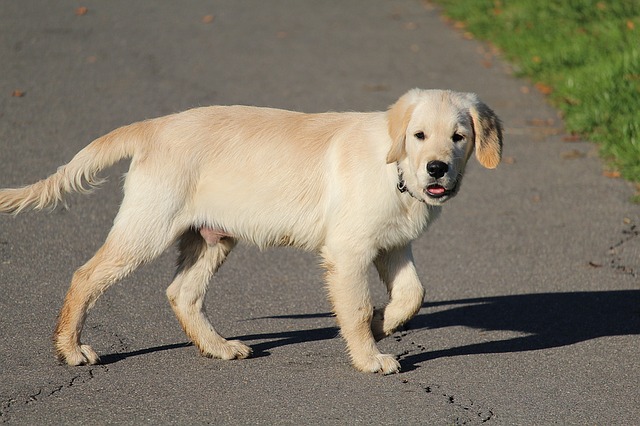Nothing is more fulfilling than welcoming a golden retriever puppy to your home. It’s no secret: golden retrievers are loved and cherished the world over, thanks to their goofy, lovely personalities. Goldens are cheerful, demonstrative, loyal, fun-loving, smart, and trustworthy with everyone—whether it’s a member of the family or a random person happening by.
For your new puppy to have a clean bill of health in the long-term, it is important to ensure that he hits all the growth milestones that are expected of this breed, especially in his formative years. But how can you tell whether or not your fur baby is on track?
Unfortunately, the growth pattern of golden retrievers throughout different stages of puppyhood is so irregular that many dog parents often wonder if something is wrong with their puppies every time they notice minor physical changes. However, the good news is that while the growth pattern of each golden puppy is unique and different, they tend to go through similar growth stages and should be manifesting similar patterns.
To help you make the most of your first moments with your Golden puppy, here are some of the necessary information and items that you need to know about your 6-month-old golden retriever. Hopefully, this information will help you monitor your puppy’s growth and development at this stage of life and ensure that he feels right at home.
What Is The Temperament Of A 6 Month Old Golden Retriever?

Generally, adult golden retrievers are intelligent, affectionate, and even-tempered. They are also playful, gentle with children, and get along with other pets and strangers. With an ever-smiling face, Goldens are known to make friends with nearly every person they meet. They are always eager to please owners, which probably explains why they respond perfectly to obedience training or why they make excellent service dogs. Golden retrievers are also exuberant and powerful dogs with lots of energy to spare.
Your 6 month old golden retriever’s temperament will not be different—expect him to be friendly, energetic, and goofy. Your puppy will play with you, your children, other pets, and any new friend that he bumps into indiscriminately.
At 6 months, your puppy’s personality will have developed and the kind of temperament that they manifest is a good indicator of how they will behave when they are adults. This study by Duffy and Serpell also confirms that the behavior of a puppy by 6 months of age is a perfect indicator of their adult personality and temperament.
Your puppy is highly likely to be more active and excitable than an adult golden retriever though, which makes early socialization very critical. While some of your dog’s adulthood temperament is shaped by genetics, a great deal comes from how he interacts with the world during his puppyhood. A puppy that is exposed to different sights, sounds, people, and experiences will often grow up into a well-rounded dog.
How Much Should A 6 Month Old Golden Retriever Weigh?
Like most dog breeds, golden retriever puppies are expected to hit varying weight goals as they age. So, how much should your 6 months old golden retriever puppy weigh? Well, if he is a girl, expect her to weigh between 29 and 72 lbs. Male Goldens tend to reach a higher overall weight, so expect your male puppy to weigh between 38 and 75 lbs.
However, the weight of your puppy will also depend on a few factors, including:
- Size of the Parents: The size of your puppy’s parents should be a good indicator of whether your puppy will be below or average size.
- Whether They Are Bred For Work or Show: Dogs bred for show tend to be heavier. So, if your puppy is a working breed, expect his weight to be near the lower end of the mentioned weight ranges.
- Health: If your puppy is suffering from an underlying medical issue, his weight and natural growth may be compromised.
Putting too much weight or growing too fast (especially due to over-feeding) isn’t healthy for your dog either. Besides obesity, too much weight can leave your puppy with a host of health issues, including hip dysplasia, skeletal abnormalities, and osteochondrosis among others.
At 6 months, your puppy may also manifest certain weird physical characteristics, including:
- Unusually long legs and tail
- Nose and ears may grow out
- Front legs may appear shorter than hind legs
But all these growth irregularities are normal and will normalize soon.
Related Post: How Much Weight Should A Puppy Gain Per Week?
How Much Exercise Does A 6 Month Old Golden Retriever Need?

Being a high energy breed, your golden retriever puppy needs proper exercise to avoid health issues, hyperactivity, and behavioral issues. A 6-month-old golden retriever can play as much as he wishes though it is important to ensure that he doesn’t exercise too much. Remember that your puppy’s bones and joints are still developing, and they can easily get damaged or injured by over-exercising.
So, how much exercise should you expose your Golden puppy to at this age? Well, a good rule of thumb, according to U.K Kennel Club, is about 5 minutes of exercise per puppy’s month of age (preferably twice a day). This translates to 15 minutes of exercise for a 3-month old puppy and 30 minutes for a 6-month old puppy.
We are talking about proper, structured exercise here—not just general play. Think of brisk walks on a leash, romping and rolling on the ground, gentle games of fetch, and tug of war. Throw obedience classes into the mix, and you will have killed two birds with one stone by getting your puppy’s energy out and teaching him how to be a well-behaved pup. Introducing puzzle games and safe chew toys at this stage will also provide your puppy extra physical and mental stimulation.
However, you should avoid extended hikes over challenging terrains, going downstairs, sudden stops while running and other forms of high-energy exercises as they can damage your puppy’s growing bones. Pressure from such activities may deform or injure your puppy’s joints. You should also be careful with your puppy over the next 6 months because it is the phase when he is most vulnerable to developing hip dysplasia.
Related Post: 12 Best Joint Supplements for Dogs with Hip Dysplasia
How Far Can A 6 Month Old Golden Retriever Walk?
The short answer is: the distance he can cover in 30 minutes. Like exercise, the rule of thumb is about 5 minutes of walk for every month of age.
But your puppy’s activity level may also dictate how far he can walk. If your puppy is used to an active lifestyle, for instance, he can handle well longer excursions. On the flip side, if he has never had an opportunity to exercise off-leash, he may not go far.
The secret is to start off your puppy at a slower pace and increase the distance gradually. For instance, at 8 weeks, you can begin with a 10-15 minutes’ walk. You can then increase it to 20 minutes walk at 12-16 weeks. And by the time he is 6 months, he will comfortably do 30-45 minutes walks albeit with plenty of breaks to keep him from tiring out.
Other tips (courtesy of the American Veterinary Medical Association) that you can leverage to make the most out of your walks with your Golden Retriever puppy include:
- Ensure that you walk in a fenced area or areas that are far from motorists.
- If you are going to use a leash, allow your puppy to set the pace. (If he tires out or gets bored and lies down, give him some time to rest).
- Avoid going too far from your home that you may need to push the puppy to keep him moving when he tires out.
- Start your puppy off with short walks, giving him plenty of opportunities to sniff around.
- As aforementioned, consider walking with your puppy on softer grounds. Long hikes over rough terrains are still potentially dangerous to your 6-month-old puppy.
- Increase the distances of your walks gradually
- Avoid taking your puppy for a walk during the coldest or hottest part of the day.
If you are still confused, consult your vet. You could also talk with a local breeder or other golden retriever owners about their experiences with Golden puppies at 6 months of age. Most importantly, monitor your puppy for signs of fatigue as it could be a symptom of a more serious health problem as opposed to longer excursions.
Why Does My 6 Month Old Golden Retriever Bite?

Golden Retrievers were bred to retrieve shot waterfowl (ducks, geese, upland game birds), in their mouth by softly carrying them back to the owners. Accordingly, it is in their genes to use their mouths a little more compared to other breeds. If your puppy has a chewing or mouthing problem at this stage of his life, therefore, you should understand that it is something in his genes. Additionally, your puppy may be starting to understand and define his role within the pack at this age. As a result, he may start manifesting territorial behaviors.
The good news is that they have soft mouths (remember that they had to gently carry the retrieved birds to their owners), so when they bite you, it is usually soft and less painful—nothing more than simply putting their mouths on you. Besides, the adult teeth of most golden retriever puppies come in around 4 months old, so their mouthing tendencies will slow down by the time they are 6 months old. It could be still prevalent in some puppies though.
One of the best ways of dealing with mouthing issues in puppies is giving them lots of exercise and mental games to tire them out so that they don’t have excess energy at their disposal to engage in the biting activity. Consider getting your 6-month-old golden retriever plenty of plush and chew toys so that he stops using your hands as chew toys.
Related Posts:
How Much Sleep Should A 6 Month Old Golden Retriever Puppy Get?
Typically, adult golden retrievers sleep for 12-14 hours per day. A 6-month-old puppy (or puppies in general) will sleep longer than their adult counterparts because they are growing fast and they rebuild their muscles while sleeping. So, expect your six-month-old golden retriever to sleep for 15-20 hours per day.
Other factors like hot weather can also make your puppy to sleep longer because it makes them feel lethargic. Giving your puppy too much food or feeding him the wrong foods can also make your puppy to sleep more.
Related Posts:
How Many Hours Does a Puppy Sleep at Night?
12 Best Dogs to Sleep With (For People Who Have Trouble Sleeping)
Is 6 Months Too Late To Train A Golden Retriever?

First things first, it all boils down to the kind of environment that your golden retriever will be living, the type of training in question, and your personal preferences. Most canine experts suggest 8 weeks as the best age to start training a golden retriever puppy. This is because puppies are believed to pick skills and knowledge faster in the first few months.
Still, 6 months is not late as there is a lot of evidence that proves that puppies at this age can still catch up on commands and skills just like their 8 weeks old counterparts. So, waiting to train your puppy once he hits 6 months of age or more won’t necessarily derail your training goals.
The only issue is that you will have to deal with a clown-y puppy who doesn’t understand basic commands like sit, stay, drop, etc. This shouldn’t be a problem if your puppy spends most of your time in your home. But if you sometimes walk with them down town or to visit friends, you will definitely want to put them under control early enough. So while training your 6-month-old Golden puppy isn’t too late, exposing him to early training is essential and comes with a lot of perks in the long term.
How Much Should 6 Month Old Golden Retriever Cost?
Golden retrievers are one of the most cherished dog breeds in the United States and globally, thanks to their impeccably gentle personalities, loyalty, and ease of care. Accordingly, their prices tend to vary greatly—perhaps more than most popular breeds.
Expect to pay between $500 and $2000 for a 6-month-old golden retriever. As you can guess, puppies that you will get at the lower end of the price spectrum are those from breeders without proper AKC documentations.
On the flip side, golden retrievers with special bloodlines tend to command higher price points—around $1000-$2000. But they are always worth the cost considering that they have fewer health issues, which often translates to fewer vet bills in the long term.
Related Post: How Much Is A Teacup Yorkie?
How Often Should A 6 Month Old Golden Retriever Pee?

Like human babies, your golden retriever puppy will pee frequently than his adult counterparts. As a quick guide, an average puppy can hold his bladder for a number of hours equal to her age in months plus one. So, your 6-month-old golden retriever can hold his bladder for about 7 hours. Learn more here: How Long Can a Small Dog Hold Its Bladder Overnight?
However, there are instances when your puppy may pee more often than expected, including:
- If they are obese or overweight
- If they have an underlying health condition like diabetes
- If they are on medication that encourages frequent urination
- If they have drunk more water than usual
To prevent accidents and ensure that your Golden puppy is getting the training and attention that he needs, consider:
- Taking him out every hour during the day
- Taking him out the first thing in the morning
- Taking him out 10-15 minutes after meals and before bedtime
- Taking him out and walking him within 10 minutes after drinking a lot of water.
- Feeding him at the same time every day so that he is prompted to go to pee consistently.
Related Posts:
How To Potty Train a Puppy to Go Outside in 7 Easy Steps
How To Potty Train a Puppy on Pads
7 Best Potty Training Sprays for Dogs
How Much Food Should A 6 Month Old Golden Retriever Eat?
Overfeeding your Golden puppy will make him grow too fast, which can lead to muscle, joint, and bone problems. As such, it is critical to only feed your puppy the right amount of food.
Most dog parents tend to think that a healthy puppy should be chubby. On the contrary, a healthy Golden puppy should be lanky. Provided that you can’t see your puppy’s ribs, you should know that he is not too thin. When you can feel but not see your puppy’s ribs, he has a perfect weight.
So, how much food is too much for a 6-month-old Golden puppy? Well, it is difficult to say exactly how much because it depends on his weight and the quality of food that you feed him (remember that premium dog foods contain fewer fillers, so you need to feed less than cheaper dog foods).
At 6 months old, a golden retriever puppyshould consume 3 cups of food in a day. Male puppies tend to eat more food compared to their female counterparts, so consider increasing the amount to 3 ½ cups or even 4 cups at 6-7 months if you own a male Golden puppy.
You should also start feeding your puppy two times a day once they hit 6 months of age. This should continue throughout their life. Free feeding is believed to contribute to obesity because it is hard to see how much your puppy is eating and should be avoided. Finally, consider feeding your puppy 90 minutes before bedtime to give him time to digest the food and go to potty before he goes to bed.
Related posts:
When Should You Switch A Puppy to 2 Meals A Day?
Conclusion
If you currently own a 6-month-old golden retriever or considering welcoming one into your home, we hope that the above tips will help you ensure that he is meeting key growth milestones that are expected of this amazing breed. Of course, it is never going to be a walk in the park. At 6 months of age, your Golden puppy may manifest a little rebellious streak.
The good news is that much of what you need to do to keep him healthy and happy is common sense—watching his diet, ensuring that he gets plenty of exercise, fulfilling his grooming needs, and calling a vet when something seems unusual. So, just be patient with your 6 month old Golden puppy and use the tips discussed herein to ensure better overall health and curb unwanted behaviors.
Related Posts:
Fluffy vs. Non-Fluffy Golden Retriever: What You Should Know When Getting a New Puppy
Canadian Golden Retriever: Everything You Need To Know Before Welcoming One to Your Home
Black Goldendoodles: Top Facts to know about this Amazing Breed
As an Amazon Associate, we may receive a small commission from qualifying purchases but at no extra cost to you. Learn more. Amazon and the Amazon logo are trademarks of Amazon.com, Inc, or its affiliates.

